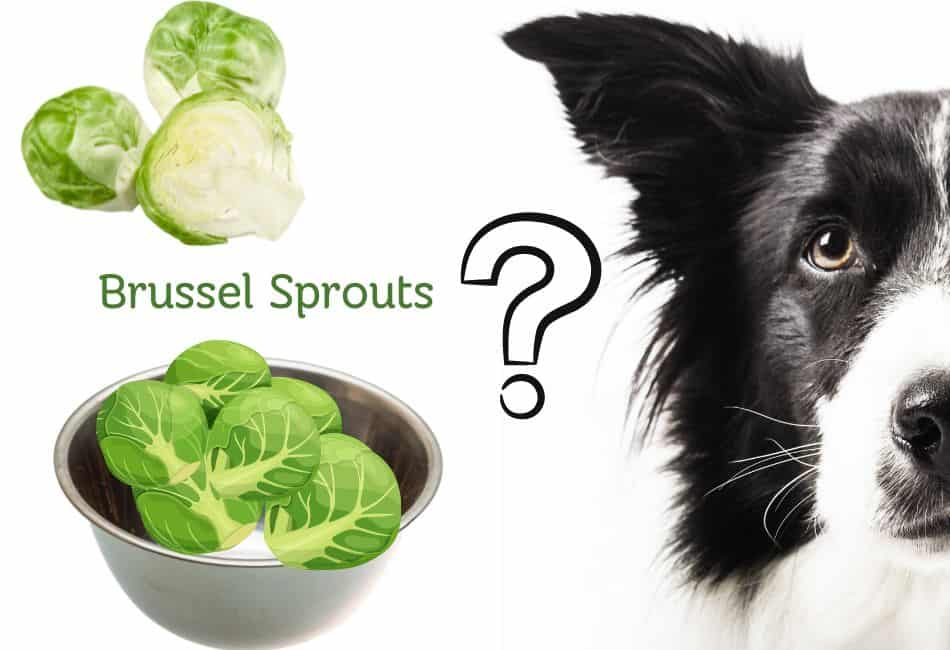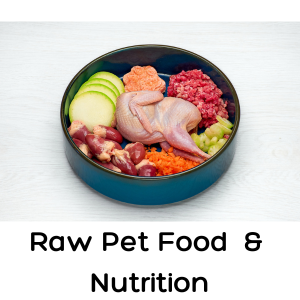Can dogs eat brussel sprouts? If you’re struggling to live a more healthful lifestyle, one of the easiest ways to succeed is to do it with a partner. Whether exercising more or eating right, an animal buddy can motivate you as much as a human buddy. In fact, your dog loves nothing more than sharing activities with you, especially when it involves eating.
Including many fresh vegetables! For example, can dogs eatC Brussel sprouts? The answer is YES, and we’re going to showcase how beneficial these little powerballs are for both you and your pooch. Finally, you get to learn all about dog farts, but first things first.
What Are Brussel Sprouts & Why Do They Look Like That?
If you’ve ever wondered whether they’re “Brussel” sprouts or “Brussels” sprouts, wonder no more. The Romans probably cultivated them but these leafy little veggies became especially popular in northern Europe during the Middle Ages.
They eventually picked up the Belgian name of the ancient city of Brussels. Can you imagine any medieval European kids asking their parents at the dinner table, “Can dogs eat Brussels sprouts?”Brussels sprouts look like tiny cabbages and taste like broccoli because they’re in the same family. Traditional winter vegetables that taste sweeter after a frost, they grow along tall, straight stalks.
The original ancestor of Brussels sprouts likely resembled the wild mustard plant but gave rise to our modern cruciferous vegetables such as kale, cauliflower, and broccoli through occasional mutations. Early human farmers learned to cultivate such mutations.
The Natural Canine Diet
Can dogs eat Brusse sprouts? They CAN, but are Brussel sprouts good for dogs? These questions lead us to the topic of the natural canine diet. We know that dogs’ ancestors were much like wolves. We tend to think of them as carnivores but in truth, wolves eat a fair amount of plant material just like bears.
In the wild, wolves live in packs. They hunt cooperatively by chasing down available wild game which they share with the rest of the pack. Available wild game included a wide variety of animal life ranging from large hoofed animals, birds of all sizes and their eggs, reptiles like lizards and turtles, amphibians like frogs, and fish.
Nearly everything was eaten: bones and marrow, skin, and internal organs including stomach contents. In addition, nursing mothers weaning pups would regurgitate food. Scavenging packs also ate poop and carrion.
Stomach contents, regurgitated food, and poop contain plant material providing fiber, probiotics, and other nutrients. Modern canine carnivores are known to consume fresh plant materials such as medicinal herbs and grasses, roots, vegetables, and fruits.
Breaking Down Biologically Appropriate Raw Food
You can see that a dog’s natural diet is a lot more than hunks of leftover boneless cooked meat! And the word “diet” doesn’t refer to a temporary eating program, either. It means a total way of living to gain optimum balanced nutrition throughout your dogs lifespan creating health and preventing imbalance.
The Biologically Appropriate Raw Food Principle is a total way of living to achieve optimum balanced nutrition resulting in health and Well~being throughout you dog’s lifespan
You may have heard of B.A.R.F.: Biologically Appropriate Raw Food. The program was founded by a veterinarian and reflects a growing approach to healthful eating for humans as well as animal. The BARF diet emphasizes the preventive and healing benefits of consuming fresh, clean, organic, unprocessed foods in the right proportions. For adult dogs, these are the BARF Model Ratio Guidelines:
- 70% muscle meat
- 10% raw edible bone
- 7% vegetables
- 5% liver
- 5% other organ meats
- 2% seeds or nuts
Because canine digestive systems aren’t the same as ours, knowing how to introduce the right natural foods into your pooch’s diet is vital. Now let’s look more closely at the doggie digestive system.
How is Dog Digestion Different from Human Digestion?
People often ask, “Why is it that dogs and other animals can eat raw meat but humans get sick if they do?” Dogs’ ancestors evolved to eat raw meat: their digestive and immune systems adapted to large numbers of microorganisms and biotoxins. One adaptation is the high concentration of hydrochloric acid in the stomach to break down microorganisms as well as animal parts including bones.
Another adaptation is the short length of the intestinal tract to allow decaying food to pass through quickly. Bacteria simply don’t have time to establish large infection-production colonies. Check out this video comparing dog and human digestive systems.
So Can Dogs Eat Brussels Sprouts?

Definitely YES, but with a few considerations. Not only are the stems too stiff and fibrous for your furry pals to digest, but they also present a choking risk for small dogs. Slice the stems out. The best way to preserve the most nutritional benefits in Brussel sprouts, which we’ll talk about in a moment, is to steam them and chop them up.
You can also lightly cook them by baking, or parboiling (partially cooking by boiling for a few moments). Many vital nutrients are destroyed by heat, so minimal cooking is important, just enough to soften the vegetables to make them more easily digested. Whether alone or mixed with other food, a few foods to avoid that are not on the digestion friendly side for pups are the following:
- Hot pepper
- Mustard or mustard seeds
- Onions
- Salt
- Spices or sauces that aren’t dog-friendly
- Vinegar
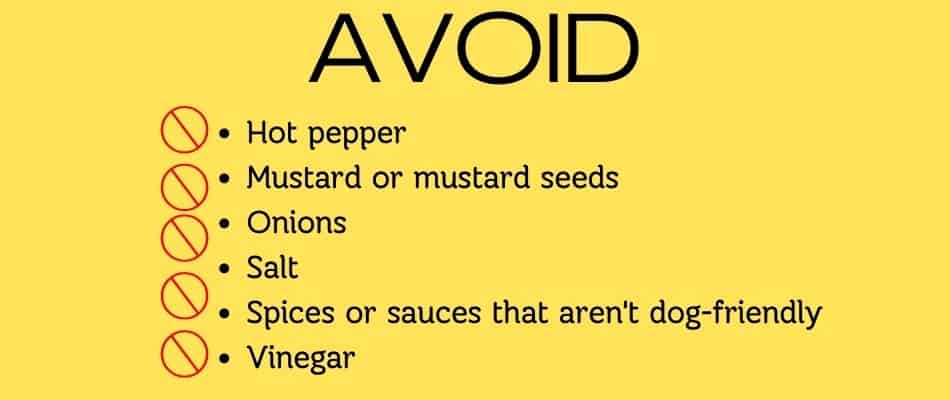
Nutritional & Medicinal Benefits of Brussel Sprouts for Dogs
Are Brussels sprouts good for dogs? How good? The answer is very good! You can include them as one of the many good veggies in your canine companion’s diet. They also make good meal supplements, snacks, and treats. We’ll give you a couple of recipes in a moment. Brussel sprouts are rich sources of:
- Vitamin A: An antioxidant aiding vision, immune health, growth
- Vitamin B1 (thiamine): For brain function, energy metabolism
- Vitamin B6 (pyridoxine): For protein synthesis, hormone secretion, food absorption
- Vitamin K: For blood clot formation, bone growth
- Additional antioxidants: For inflammation reduction, cell damage prevention and repair
- Alpha-linolenic acid (ALA): A type of omega-3 fatty acid for support of the circulatory and immune systems, brain function
- Folate: For metabolic functions such as DNA and red blood cell production
- Manganese: For protein and amino acid digestion
- Potassium: For muscle function, enzymes, nerves
- Sulforaphane: Linked to inflammation reduction, stabilizing blood sugar, anticancer activity
Bonding Through Food With Your Best Buddy
Earlier we mentioned the benefit of having a partner for sharing healthful foods and activities. Sharing food is one of the strongest ways to create lifelong bonds with the people and animals you care about the most. Dogs are smart. If you share junk food defiantly, your pooch will pick up on your secret sense of shame. Your pooch will likewise sense your pride and love when you share nutritious snacks that are good for both of you.
You might chuckle “Eewww!” to think of Brussels sprouts as a treat. But did it ever occur to you that we can have prejudices against foods the same way we have prejudices against other humans? Many people enjoy laughing about the taste of Brussels sprouts almost as if it were a negative bonding ritual to join together against something you don’t like.
You can actually reprogram your mind to accept Brussels sprouts as a positive sharing experience with your best fur kid. Every time you handle one of those leafy green balls of nutrition, picture the ways your pooch will love them best. You’ve got this!
But wait! There’s More! Cryptonutrients

Along with micronutrients–essential nutrition required in tiny amounts–there’s such as thing as cryptonutrients. These are the hidden nutrients, the ones that haven’t been discovered yet but will be. Donald Rumsfeld, a government official and businessman, famously commented about “known unknowns; that is to say, we know there are some things we do not know.
But there are also unknown unknowns–the ones we don’t know we don’t know.” It’s exciting to think about what cryptonutrient discoveries in Brussel sprouts await us.
Can Puppy Dogs Eat Brussels Sprouts?
Good nutrition from early on will give a rapidly growing puppy the right start in life with the healthiest possible body and brain. Prevention of medical problems later begins with nutrition adapted for each life stage. What’s more, training your dog early to enjoy sharing healthful treats is like teaching a kid.
Can Elderly Dogs Eat Brussels Sprouts?
Consider meeting with a holistically minded vet about the role of different foods for your aging canine companion. Nutrition often does double duty as medicine in geriatric dogs. Research indicates that certain supplements can help prevent or slow the onset of canine cognitive dysfunction (CCD).
In fact, scientists in the UK have been experimenting for more than five years with retinoic acid. Derived from vitamin A found in Brussel sprouts and other plants, synthetic versions show promise as a treatment for neurological disorders including dementia. Are Brussels sprouts good for dogs? They might be especially good for old dogs having trouble learning new tricks as well as remembering the old ones.
Will Brussels Sprouts Give My Dog Gas?
Like other cruciferous vegetables, Brussels sprouts contain raffinose, a carbohydrate that is difficult for dogs and humans to digest. Bacteria begin to ferment it in the intestines where, like yeast fermenting beer, the by-product is gas. Although Brussels sprouts are rich in immune-supporting, inflammation-fighting isothiocyanates including sulforaphane, these compounds contain sulfur.
If you ever wondered what causes the distinctive odor in both canine and human flatulence, it’s sulfur. To help ease uncomfortable bloating, you can offer your pooch some banana, pureed pumpkin, or cooked sweet potato.
How Often Can Dogs Eat Brussel Sprouts & How Much Is Okay to Give?
Are Brussels sprouts good for dogs? By now you know the answer! Moderation is the key. Start with a small portion, maybe half a sprout depending on the weight of your dog. See how they digest it- offer no more than three Brussels sprouts treats per serving from time to time.
How to Prepare Brussels Sprouts for Dogs
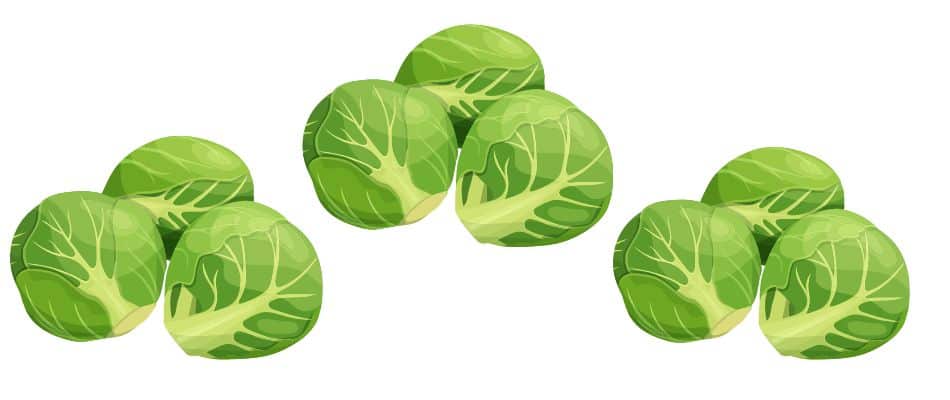
We answered your question “Can dogs eat Brussels sprouts?”, so now we’ll explain the next question: How do you cook Brussel sprouts for dogs? Steaming is the best method for preserving the nutrients while softening the tough leaves. You don’t want them mushy, just soft. Here’s how:
- Prepare Brussels sprouts by removing outer leaves, slicing out entire stem, and rinsing thoroughly in running water.
- Pour 1-2 inches water into deep pot and turn on heat.
- When water is boiling, place vegetables in steamer basket or colander so water barely covers bottom.
- Cover and steam 6-10 minutes or until tender but not mushy. Drain.
Alternative methods:
- Boil water in a wok and suspend Brussels sprouts in colander, wire strainer, or shallow bowl over boiling water. Cover and steam.
- Heat oven to 200F. Boil water in pan on stovetop. Pour water into baking pan with rack. Place veggies on rack and cover with aluminum foil. Place in oven and steam.
Chop into pieces and mix with dog food.
Recipes For Dogs
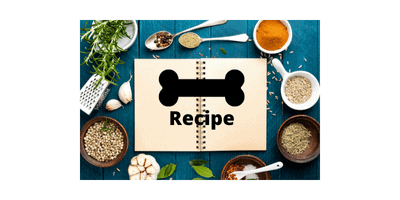
Veggie Stew
Ingredients:
- 1-1/4 quarts bone broth
- 1 lb (about 3 cups) butternut squash
- 1/2 lb (about 1-3/4 cup) acorn squash
- 1/3 lb (about 1 cup) beetroot
- 1/3 lb (about 1 cup) broccoli (brussel sprouts)
- 1/3 lb (about 1-3/4 cup) kale
- 1/4 lb (about 1-3/4 cup) beet greens
Instructions:
- Make bone broth by adding marrow bones (as well as head and feet if desired) to water-filled cooking pot; heat to boiling; cover, lower heat, and simmer 9 hours.
- Soak veggies in warm water for half an hour to clean.
- Strain broth.
- Add squash and beets first, cooking 7-10 minutes.
- Steam leafy greens including Brussels sprouts 2-5 minutes, then add to pot.
- All done! Add to dog’s meal as 10% veggie/nuts/fruit portion according to BARF guidelines. Freeze remainder in small containers.
www.perfectlyrawsome.com
=========================
Venison & Vegetable Stew

Can dogs eat Brussels sprouts? In a delicious customizable stew with a variety of vegetable choices from your own garden? Absolutely yes. In fact, take some for yourself and season to taste.
Ingredients:
- 4 cups ground venison (or other protein source of your choice including chicken, duck, beef, bison, fish, etc.)
- 4 cups low sodium broth or bone broth
- 1/2 cup rolled oats
- 1/2 cup chopped green beans
- 1/2 cup chopped carrots
- 1/2 cup chopped Brussels sprouts
- (May use other vet-approved veggies such as celery, cucumbers, pumpkin, spinach, sweet potatoes, or zucchini)
Directions:
- Brown meat until about 3/4 cooked, using olive oil if needed.
- Combine all ingredients into large pot turned to medium heat.
- Bring to boil and continue cooking 15 minutes.
- Cool and serve!
source: www.topdogtips.com
FAQ–Frequently Asked Questions
What if my dog eats too many Brussels sprouts?
Call the vet for the most accurate and immediate advice. Monitor over the next few days for a bloated belly, discomfort, constipation, diarrhea, vomiting, loss of appetite, or other abnormal gastrointestinal signs. Keep fresh water available both indoors and outdoors. Offer wet treats such as canned dog food, apple slices, and other favorite fruit and vegetable snacks. Plain pumpkin and sweet potatoes, either canned or baked, are used by many canine experts to promote pooping.
Are Brussel sprouts toxic to dogs?
No. Unlike many foods, Brussels sprouts contain no known toxins. The only issue is gas. A small amount is normal but too much is uncomfortable. And if your dog has sensitive feelings, then being subjected to ridicule will hurt the bond you share, so remember to be sympathetic.
Is it OK for dogs to eat raw Brussels sprouts?
No. Your dog can’t easily digest the fiber-rich leaves. The result will be excess gas or even an intestinal blockage. The optimum balance between raw and cooked sprouts is achieved by steaming. Another thing: even though fresh Brussels sprouts are cute, they’re hard when they’re raw and can get stuck in your dog’s throat.
Can dogs chew on Brussels sprout stalks?
No. The stalks are as indigestible to your dog as a tree twig is to you. The fibers can get caught in the teeth, cause gagging or choking, or worse. Slice them out and toss them in your garden’s compost pile.
Can dogs eat Brussels sprouts as leftovers?
They shouldn’t if the sprouts have been drenched in butter, seasonings, sauces, or juices from other foods that were on the plate.
Final Thoughts
Can dogs eat Brussels sprouts? Not only can you answer that now, but you also know about Romans eating them, about dogs’ natural diet, about the incredible powerball nutrition in Brussels sprouts, about cryptonutrients waiting to be discovered, about the chemistry of flatulence, about steaming vegetables, and about strengthening the bond between you and your beloved hound dog by sharing nourishing food together.
Other Related Posts Of Interest
Can Dogs Eat Beets? How To Use Beets For Allergies, Liver Health & Immunity
Can Dogs Have Zucchini? This Veggie Packs A Powerful Punch
Can Dogs Eat Bell Peppers? Find Out WHICH Ones
Can Dogs Eat Raw Chicken Bones? Why They Should!
Resources
Directory of veterinarians practicing holistic/integrative medicine:
https://www.ahvma.org/find-a-holistic-veterinarian/
How to steam veggies:
https://thegardeningcook.com/vegetable-steaming-times/
======================================

